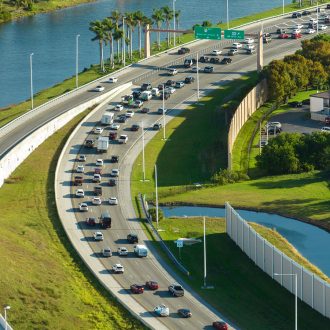
As Florida residents, we all cherish the freedom of cruising down our sun-drenched streets. However, with the sobering statistic of over 400,000 crashes reported annually in Florida, it’s imperative that we address the critical issue of road safety.
Understanding the Florida Driving Landscape
Before delving into preventative strategies, it’s crucial to comprehend the primary causes of accidents in our state. Distracted driving, particularly due to smartphone use, has emerged as the leading cause of collisions. The allure of checking messages or scrolling through social media while behind the wheel has proven to be a dangerous temptation for many drivers.
Speeding continues to be a significant factor, with many motorists underestimating the risks associated with exceeding posted limits. Despite stringent laws and public awareness campaigns, impaired driving remains a persistent issue on Florida roads. Reckless behaviors, such as aggressive lane changes and tailgating, further contribute to the state’s accident statistics.
Moreover, Florida’s unique weather patterns, characterized by sudden and intense rainstorms, create additional hazards for unprepared drivers. These conditions can transform familiar roads into treacherous surfaces in a matter of minutes.
Strategies for Accident Prevention
Maintaining Focus on the Road
The importance of undivided attention while driving cannot be overstated. We strongly advise implementing a strict “no phone” policy while operating a vehicle. If communication is necessary, utilize hands-free devices or, better yet, pull over to a safe location to address any urgent matters. It’s essential to recognize that even seemingly harmless activities like eating or adjusting the radio can divert your attention at critical moments.
Adhering to Speed Limits
Respecting posted speed limits is fundamental to road safety. It’s not merely about avoiding tickets; it’s about giving yourself adequate time to react to unexpected situations. When adverse weather conditions arise, such as the frequent afternoon showers common in Florida, reducing your speed becomes even more critical. We recommend planning your journeys with ample time to reach your destination, alleviating the pressure to speed.
Abstaining from Impaired Driving
The decision to drive under the influence of alcohol or drugs can have life-altering consequences. We strongly advocate for planning ahead when alcohol consumption is anticipated. Designating a sober driver, utilizing ride-sharing services, or opting for public transportation are all viable alternatives to ensure your safety and that of others on the road. It’s also important to be aware that certain medications can impair driving abilities, so always consult with your healthcare provider about potential side effects.
Embracing Defensive Driving Techniques
Adopting a defensive driving mindset is crucial for navigating Florida’s diverse roadways. This approach involves maintaining awareness of your surroundings, anticipating potential hazards, and always having an escape route in mind. We recommend practicing the three-second rule to maintain a safe following distance, which can be extended in adverse conditions.
Prioritizing Vehicle Maintenance
Regular vehicle maintenance plays a crucial role in accident prevention. We advise adhering to your vehicle’s recommended service schedule, paying particular attention to brake systems, tire condition, and all lighting components. A well-maintained vehicle not only reduces the risk of mechanical failure-related accidents but also improves overall handling and responsiveness.
Navigating Rush Hour Traffic
Rush hour presents heightened risks due to increased congestion and driver impatience. When possible, consider adjusting your schedule to avoid peak traffic times. If that’s not feasible, maintain a calm demeanor and allow extra time for your commute. Utilize traffic apps to identify less congested routes and always prioritize safety over saving a few minutes.
Adapting to Florida’s Weather Challenges
Florida’s climate presents unique challenges for drivers. During sudden rainstorms, it’s essential to reduce speed and increase following distances. Ensure your vehicle is equipped with proper tires and functioning windshield wipers. Be particularly cautious of standing water, as hydroplaning can occur even at moderate speeds.
Special Considerations for Florida Drivers
Tourist Areas and Unfamiliar Drivers
As a popular tourist destination, Florida sees a significant influx of out-of-state drivers who may be unfamiliar with local roads and traffic patterns. Exercise additional caution around popular attractions, beaches, and rental car facilities. Anticipate sudden stops or turns, and practice patience with drivers who may be distracted by navigation systems or sightseeing.
Pedestrian and Cyclist Safety
Florida’s year-round pleasant weather encourages outdoor activities, resulting in a higher presence of pedestrians and cyclists. Always yield to pedestrians at crosswalks and be vigilant in residential areas and near schools. When passing cyclists, provide ample space and be prepared for sudden movements.
Accommodating Senior Drivers
With a substantial senior population, Florida drivers must be prepared to share the road with older motorists who may have slower reaction times or limited visibility. Exercise patience and be prepared to adjust your driving accordingly. If you have senior family members who drive, encourage regular vision checks and driving assessments to ensure their continued safety on the road.
How to avoid getting into a car accident in Florida FAQs
What is the primary cause of crashes on Florida roads?
Distracted driving, particularly texting while driving, is currently the leading cause of car accidents in Florida.
What are three effective strategies to avoid a crash?
Maintaining focus on the road, strictly adhering to traffic laws and speed limits, and practicing defensive driving techniques are three highly effective strategies for crash prevention.
How can we collectively improve safety on Florida roads?
By staying alert, complying with traffic regulations, ensuring proper vehicle maintenance, and adapting to weather conditions, we can significantly enhance road safety for all users.
What are the three primary types of accident prevention?
The three main categories of accident prevention are engineering controls (road design and vehicle safety features), education (driver training and awareness campaigns), and enforcement (traffic laws and penalties).
How do you stay safe in a car accident?
In the event of an accident, ensure your safety first, move to a safe area if possible, turn on hazard lights, call for help, and avoid discussing fault with anyone except law enforcement.
Why should you stay safe on the road?
Staying safe on the road protects not only yourself and your loved ones but also contributes to the well-being of the entire community. It helps prevent injuries, fatalities, and the emotional and financial toll of accidents.
How can a road accident be reduced?
Road accidents can be reduced by following traffic laws, avoiding distractions, maintaining vehicles properly, adapting to weather conditions, and practicing defensive driving techniques.
What are 3 things you must have when an accident happens?
When an accident occurs, you should have: 1) A way to document the scene (e.g., smartphone for photos), 2) Your insurance and vehicle registration information, and 3) Emergency contact numbers, including your insurance company and a trusted car accident attorney.
What is the single biggest cause of crashes on the road?
Distracted driving, especially due to smartphone use, has emerged as the leading cause of collisions in Florida.
Best Auto Accident Lawyer Near Me
At Alicia Jeskey P.A., we are dedicated to promoting road safety and supporting those affected by car accidents in Orlando and Central Florida. Remember, safe driving is not just about protecting yourself and your loved ones; it’s about contributing to the well-being of our entire community. Should you find yourself in need of legal guidance following a car accident, we are here to assist you. We offer free case evaluations to help you/understand your rights and options.
For expert legal advice or to schedule a consultation, please don’t hesitate to contact us at 407-866-0126 or visit our website. Your safety and legal rights are our top priority, and we’re committed to guiding you through any challenges you may face on Florida’s roads.

